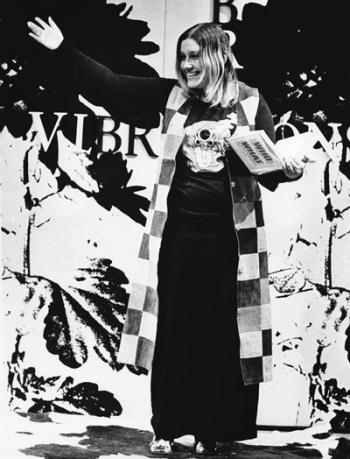Australian journalist Lillian Roxon was a pioneer when it came to giving rock music the serious attention it deserved.

Australian journalist Lillian Roxon was a pioneer when it came to giving rock music the serious attention it deserved.
Lillian Roxon (1932–1973) was an Australian journalist who lived in New York in the 1960s and 70s. Dubbed ‘the mother of rock’, she wrote the iconic Lillian Roxon's Rock Encyclopedia, which was published in 1969.
In the 1970s Roxon documented the emerging rock revolution and later the birth of punk from her haunt – the New York city music club Max’s Kansas City – which was frequented by Iggy Pop, Andy Warhol, Lou Reed, Debbie Harry, Alice Cooper, Jimi Hendrix and David Bowie.
During 1971 she wrote and presented a show called Discotique – a two-minute ‘daily newscast from the world of music’. The shows, which ran from March to October 1971, were recorded and then pressed onto vinyl LPs (20 shows fitted onto one LP) and syndicated on 250 radio stations in the United States. At the time, her voice would have been a curiosity for listeners unaccustomed to hearing Australian accents.

Roxon died tragically at the age of 41 from a severe asthma attack.
The Discotique recordings in our collection date from 28 June to 23 July 1971 and appear on an LP that the Roxon family donated to the NFSA in 2013. Given Roxon’s significance to the history of rock music, Radio Archivist Maryanne Doyle had long been looking for radio recordings of Roxon reporting on the music scene.
Maryanne first heard about the Discotique recordings thanks to Robert de Young, producer of the documentary Mother of Rock, about Roxon’s life. Mother of Rock (2010) is preserved in the NFSA collection as part of the National Documentary Program funded by Screen Australia.
In an online exclusive, here are six complete episodes of Discotique.
Roxon asks provocatively ‘Have the [Rolling] Stones changed?’. Her delivery is lightning fast so she manages to cram in details of the band’s personal lives, various controversies and an appraisal of their latest record, all in two minutes. She goes from provocateur back to avid fan – her voice softens as she concludes that their latest record has been ‘beautifully, carefully done, but it’s still the Stones. I hope they always stay that way.’
Roxon makes no pretense at journalistic objectivity in this report about John Lennon and Yoko Ono ‘mingling with the citizens’ of New York. From her decisive ‘Well, it’s about time’, Roxon asserts her approval. She recounts the famous couple’s wanderings about town, from shopping for antiques with Andy Warhol to seeing David Peel and the Lower East Side, a group that only performs in parks. In accord with the style of ‘New Journalism’ popularised in the late 1960s and 70s, Roxon inserts her opinion into the story by saying ‘The news that John was out and about was the best I’ve had in years’. Her personal but authoritative delivery adds to the sense that we are hearing news as it happens from a trustworthy source.
Roxon’s passion for the advancement of women in rock shines through in this report about female rock groups Fanny and Pride of Women. They don’t get an easy ride though; here she defends her lack of enthusiasm for Fanny’s first album with her fabulous trademark no-nonsense approach: ‘their album was pleasant enough, but lightweight’. Although she’s quick to express her opinion, Roxon is refreshingly humble enough to admit when she’s wrong and that she is not above changing her mind about Fanny’s music after speaking with the band.
Roxon champions ahead-of-their-time band The Velvet Underground and lead singer Lou Reed, who is about to strike out on his own. The report shows her ear for talent and position at the vanguard of '70s rock, as her comments about Reed’s future success as a solo artist proved accurate. Amid an entertaining, fact-filled history of Reed and the Underground, Roxon drops some beautifully eloquent appraisal of Reed’s ‘sinister, cynical and yet strangely poetic songs’. She breathes equal depth of feeling into her one-word summation of a new Velvet Underground live album as simply ‘cosmic’.
In Roxon’s editorial about the trouble with album covers, she is clearly addressing her audience as one rock fan to another (‘You can say it’s irrelevant, but you know and I know that it isn’t’). She sets out her list of demands – mainly to do with giving fans as much ‘vital’ information as possible (remember this is pre-internet) about a band or artist. She uses wry humour in her diatribe, saying that if record people think it insults their listeners to spoonfeed them with too much information, then ‘you can insult me any time’.
Roxon is out to correct some misconceptions about Peter Allen’s music in this report. She is a passionate advocate for his new album, with 12 songs that ‘tear into your emotions like barbed wire’. In dismissing his previous, ‘very showbiz’ appearances on late-night TV, Roxon is speaking as one with her hip, rock-loving audience but urging them to give Allen’s new solo music a chance like she did. Her critique carries power because of the obvious sincerity behind it; you can hear in her voice that this album has moved her greatly, even without her saying ‘this is a very important album and everyone should listen to it’. Roxon’s enthusiasm inadvertently accentuates her Australian accent, never clearer than on ‘love and marriage shouldn’t be like a horse and carriage’.
This article was first published in 2015. The text was updated in 2023.
Want to be the first to hear stories and news from the NFSA?
Subscribe to our newsletter and never miss out.
All stills courtesy of the family of Lillian Roxon and the book Mother of Rock: the Lillian Roxon Story by Robert Milliken (Black Inc 2002).
The National Film and Sound Archive of Australia acknowledges Australia’s Aboriginal and Torres Strait Islander peoples as the Traditional Custodians of the land on which we work and live and gives respect to their Elders both past and present.